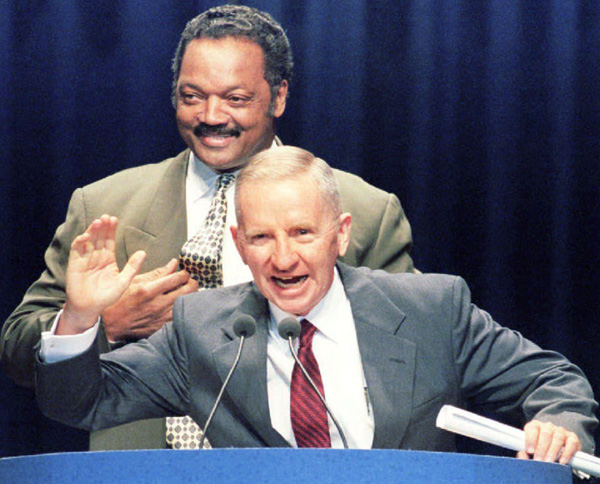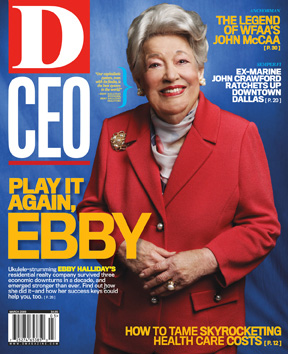On the surface, EDS founder Ross Perot Sr. and international interior designer Trisha Wilson have about as much in common as khaki fatigues and an Armani suit. Yet their lives share a common thread: their origins were so humble that failure wasn’t an option.
D CEO has examined the lives and origins of seven of Dallas-Fort Worth’s most successful executives, and found some lessons that still-aspiring capitalists can take heart in—even in today’s schizophrenic marketplace.
Ironically, none of these mega-innovators worship the almighty dollar. Instead, they have a deep faith in themselves and something bigger than themselves; they treasure ideals above a fast buck; and all of them have a rabid proclivity toward finding and keeping like-minded people who will help them get where they want to go.
And, not one of them is a whiner.
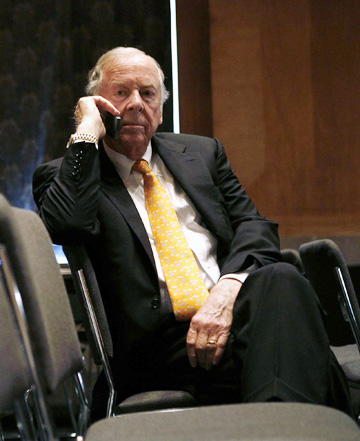
Sleeping In His Ford
T. Boone Pickens mowed grass until he was old enough to throw newspapers. Then, he parlayed a tiny route (with 28 papers) into a 156-home route. He worked as a roughneck on a drilling rig, as a fireman on the railroad, and as a worker in a refinery. He had no career plan. But when he was in college, he decided to major in geology, on the advice of his father.
The energy industry drove much of the economy in Oklahoma (and still does). Pickens’ father, who once funded speculative oil wells, eventually took a job with Phillips Petroleum Co., as did Boone.
But Boone wasn’t content to sit and collect a paycheck at Phillips. He saw rampant waste and a strong aversion to hard work and creativity.
“Every morning, a bell rang at five minutes before eight, signaling you to your desk, just like at school,” he writes in The First Billion is the Hardest. “At noon, everyone would be standing by the door, waiting for the lunch bell. At one, the bell would ring, signaling that lunch was over. The final bell rang at five, and they didn’t want anybody staying past quitting time.”
Boone Pickens found the routine so maddening, and the evidence of Big Oil’s incompetence so overwhelming, that he cashed in his $1,300 Phillips pension, bought a Ford station wagon (in which he slept while he was in the field) and earned about $75 a day (which translates to about $600 a day now) as a consultant for oil-well site work. His goal was to put enough drilling deals together to make a decent living.
“Except for a few members of my family, no one gave me a prayer of succeeding,” he says in The First Billion. “My single-minded focus gave me an edge: I was now going to succeed or fall on my ass.”
Forbes magazine last listed Pickens as being worth $3.1 billion.
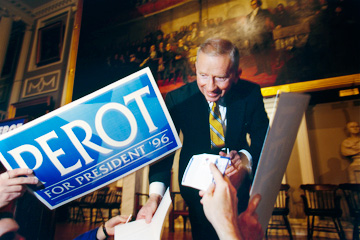
Warning Against Debt
Ross Perot Sr. looks slightly incredulous when he’s asked to compare what’s happening with today’s markets to the way things were when he started out.
“Compared to when I started out in life, in 1930, one year after (the crash of) 1929, things look really good here” now, he says with a laugh. “The problems then were so basic. The typical person who did work on a home made $5 a week. Just think of that.”
Perot’s mother washed clothes on a washboard. They lived in a house in Texarkana that would cost about $60,000 in today’s dollars.
His father, Gabriel Ross Perot, paid cash for the house—just like everything he bought.
Gabriel set—and continues to set—an example through a typewritten list of his that Perot still displays at Perot Systems headquarters:
“1. The world wants things done, not excuses. One thing well done is worth a million good excuses.”
“2. Meet obstacles or meet failure.”
The list numbers 34 other pieces of advice that Perot says he still relates to, today.
Though his son, Ross Jr., is active in running Perot Systems Corp. the facility itself still strongly reflects Perot Sr. and Perot Sr.’s father’s life experiences.
Perot Sr. still eats meals in the company cafeteria. (It’s something he picked up from his experience in the business world; everyone competes on a level playing field.) That means even executives should dine and talk together. And he still drives a used car; recently, he bought a used Mercury.
Don’t get me wrong: Ross Perot Sr. still rants against the federal government running up debt. But I had no idea that he was against personal debt as well.
“Spending beyond your means can put you under severe and unnecessary stress,” Perot preaches in his book Ross Perot: My Life and The Principles For Success.
While he accedes that going into debt to buy a house is acceptable, “do not make a down payment on a house that you really cannot afford.”
Isn’t that what happened with the subprime mess we’re still trying to get out of?
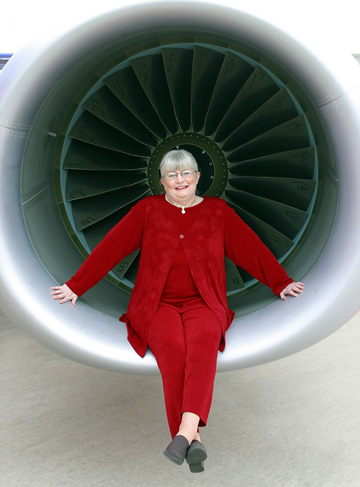
No Money For School
Former Southwest Airlines president Colleen Barrett prefers to fly below the radar, which is where she was when she started working as a secretary for Herb Kelleher in 1967.
Back then, Kelleher was working as outside counsel on behalf of Southwest Airlines. Barrett joined Kelleher as a legal secretary, and stayed with him when he joined Southwest Airlines in 1971.
“I kind of think myself as a misfit,” Barrett told a crowd of Southwest Airlines employees in her farewell address last year. “But then, I found another misfit that was worse than me,” she said, pointing to Kelleher. “And he just believed you could do anything you wanted to do, as long as you worked hard enough at it.”
Barrett used that occasion to confess that no career path, upbringing, or personal wealth had prepared her for what would be the ride of her life at Southwest.
Seven years after they joined the company, Southwest’s chief executive quit. Kelleher stepped up to fill the void. And wherever Kelleher went, Barrett followed. Even when it meant the presidency of Southwest Airlines.
A Dallas Morning News profile of Barrett describes her early days as a small-town Vermonter:
Back then, she was Colleen Crotty, who dreamed of attending law school, but had no money to attend. So, she became a legal secretary and married a military man named Allen J. Barrett. They moved from Vermont to San Antonio, where Barrett met Kelleher when she began working for his law firm. The news account says she divorced her husband in 1972.
Barrett’s love for the airline’s employees earned her the title “Mom.”
“I have no reason to be in the position” that I’m about to leave, Barrett told employees on her last day on the job last year. “I have no background for it. … I did not have the financial or developmental means in my neck of the world where I grew up to achieve any of this.”


